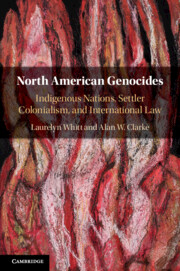Book contents
- North American Genocides
- North American Genocides
- Copyright page
- Dedication
- Epigraph
- Contents
- Preface
- Acknowledgments
- Introduction
- Chapter 1 North American Genocide Denial
- Chapter 2 The Legal Case for North American Genocides: a Retrospective Methodology
- Chapter 3 Settler Colonialism and Indigenous Nations
- Chapter 4 A Legal Primer for Settler Colonial Genocides
- Chapter 5 The Beothuk Nation (1500–1830)
- Chapter 6 The Powhatan Tsenacommacah (1607–1677)
- Chapter 7 The Conventional Account of Genocide: from a Restrictive to an Expansive Interpretation
- Chapter 8 Toward an Account of Systemic Genocide
- Appendix Convention on the Prevention and Punishment of the Crime of Genocide
- Index
Chapter 8 - Toward an Account of Systemic Genocide
Published online by Cambridge University Press: 12 July 2019
- North American Genocides
- North American Genocides
- Copyright page
- Dedication
- Epigraph
- Contents
- Preface
- Acknowledgments
- Introduction
- Chapter 1 North American Genocide Denial
- Chapter 2 The Legal Case for North American Genocides: a Retrospective Methodology
- Chapter 3 Settler Colonialism and Indigenous Nations
- Chapter 4 A Legal Primer for Settler Colonial Genocides
- Chapter 5 The Beothuk Nation (1500–1830)
- Chapter 6 The Powhatan Tsenacommacah (1607–1677)
- Chapter 7 The Conventional Account of Genocide: from a Restrictive to an Expansive Interpretation
- Chapter 8 Toward an Account of Systemic Genocide
- Appendix Convention on the Prevention and Punishment of the Crime of Genocide
- Index
Summary
It may well be that the inadequacies riddling the Conventional account of genocide prove insurmountable – including the failure to prohibit stand-alone cultural genocide which, we have argued in the preceding chapter, so profoundly undermines the treaty’s purpose and object of protecting human group viability. Our own view is that while we must rely upon the Conventional account of genocide for some of the things it is able to do, such as to hold génocidaires, at least in some instances, criminally responsible for the atrocities they enact, and to chip away at certain genocide denials in other cases, this cannot help but fall markedly short of what is required if we are to effectively address and prevent human rights violations of this magnitude. This would be true even if the expansive interpretation of the Conventional account were to entrench itself more deeply and ultimately displace the restrictive interpretation of genocide. The reason is that the Conventional account of genocide is a legal tool, designed for specific legal ends which were themselves constrained by the politics of power that prevailed among the post-war community of states charged with the Convention’s drafting.
- Type
- Chapter
- Information
- North American GenocidesIndigenous Nations, Settler Colonialism, and International Law, pp. 228 - 241Publisher: Cambridge University PressPrint publication year: 2019

